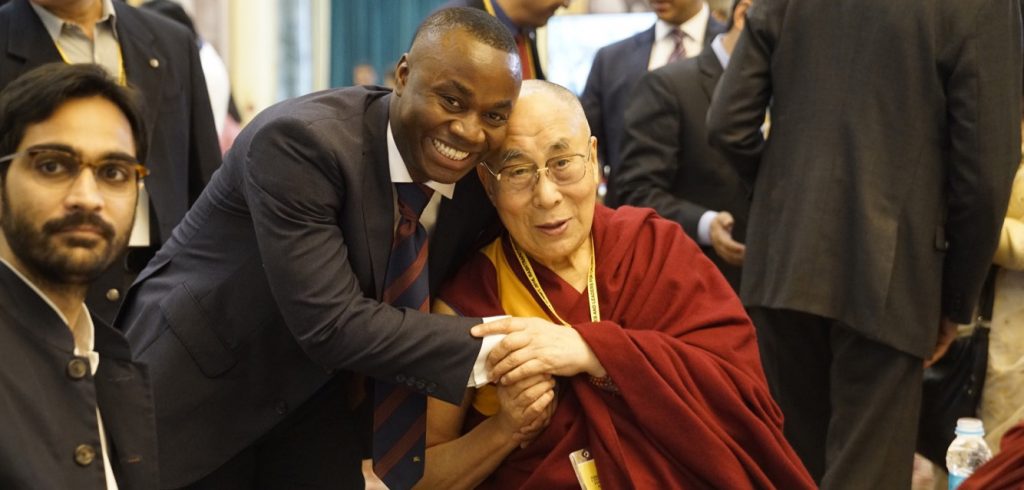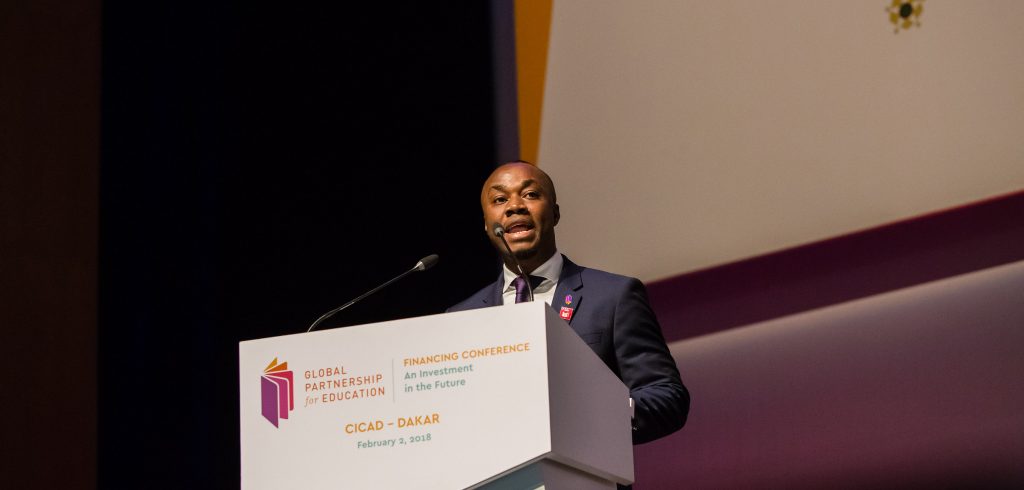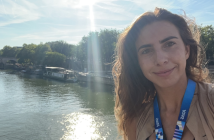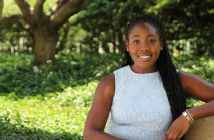Across the globe, an estimated 264 million children—enough individuals to rank as the fourth most populous nation on earth—currently lack access to education. When Mohamed Sidibay speaks on their behalf before heads of state and corporate titans on various continents, his composed voice is a living testament to the vast, untapped potential the world’s uneducated youth possess. If you can relate to me, he tells those listening, you can relate to the countless children not in this room.
At age 5, Sidibay watched helplessly as rebels murdered his parents and two siblings. Those same rebels then forced him to join the civil war in his native Sierra Leone, located along Africa’s western edge. Barely taller than the assault rifle that was foisted on him, Sidibay fought as a child soldier for the next four and a half years, each day promising a new lesson in the banality of evil. His life took a fortuitous turn after an Italian priest rescued several boys in his group—a development that not only freed Sidibay but led to his first educational experience not involving guns and bullets.
Almost two decades later, Sidibay arrives at Fordham Law School as a 1L with a clear purpose—to learn and master the legal framework necessary to facilitate greater educational opportunity for the masses of children in the shadows, both in his native Sierra Leone and around the world, and to end the use of child soldiers.
“No child in this world, regardless of where they’re from, should have to rely on chance to receive an education,” Sidibay said. His strong connection with the Fordham chapter of Black Law Students Association and Director of Admissions Kathryn Espiritu convinced him that Fordham would be like joining “a family, a wonderful community.”
“There’s tremendous evil in mankind, but there’s also tremendous potential for good,” he added. “I’m hoping to bridge that divide at Fordham.”
A Kid, Rescued
Sidibay’s childhood, until almost his 10th birthday, revolved around his duties as a forced soldier. In those long days of blood and ruin, he conceived of no future—only the miserable present. Education was out of the question. “I never imagined anything beyond the barrel of an AK-47,” Sidibay recalled. “I hadn’t been taught to think about the outside world.”
Sierra Leone’s civil war, which started in 1991, appeared to have reached a ceasefire in early 1999, when, after the diplomatic intervention of world leaders, the rebels and the government signed the Lomé Peace Accord. However, sporadic fighting flared among the warring factions over the ensuing three years. In the midst of the lingering chaos, Father Giuseppe Berton, an Italian who founded the Family Homes Movement in Sierra Leone for children in need, rescued Sidibay and many other child soldiers like him prior to the war’s end in January 2002. By then, the 11-year conflict had claimed 50,000 lives.
“If it wasn’t for Father Berton, who stood in the face of great evil, I don’t think they would have let us go,” Sidibay said. “How he convinced the rebels to let us go still baffles me.”
Sidibay’s armed nightmare had ended; however, hostility in his community remained. The Red Cross placed him with a family that shared his last name, yet bore no relation. “I was looked upon as a burden, another mouth to feed, as a pariah,” he reflected. In general, the community and society rejected the child soldiers’ reintegration because they viewed young boys, like Sidibay, as perpetrators who had robbed them of their family members and homes and disrupted their lives for a decade. These same people, Sidibay explained, failed to consider the hell he endured.
“I lost my entire childhood and my entire family,” he said. “I can never regain that time or get my family back. What I lost I couldn’t get back, which is something they didn’t understand.”
When UNICEF attempted to enroll Sidibay, then age 10, in a Sierra Leone public school for the first time, the school initially balked; it was concerned about the image his enrollment would convey. Not until UNICEF supplied books and pencils for the entire student body did Sidibay, who was illiterate at that point, enroll.
“I wish I could tell you that I kept going back to school because I wanted to learn,” Sidibay said. “But the biggest motivator was that it was the safest place for me to be.” He credited a girl in his community with deciding to help him learn when others shunned him. “It was only after being taught to read and write that I realized education is cool,” he said. “Had I not left Sierra Leone, my education journey would have ended a long time ago.”
Disillusioned Teen
Sidibay considered the United States to be a perfect place, so unlike Sierra Leone, when he arrived stateside on April 27, 2007. The organization iEARN-USA flew him to the States to speak at a peace conference at Kenyon College in Ohio. It was the first of countless speaking engagements in his future. Yet, Sidibay, then age 14, considered it noteworthy for other reasons.
“To me the most memorable thing about that trip, beyond seeing people in college, was the idea that when I walked into the student cafeteria, it was all-you-can-eat,” said Sidibay, who barely spoke English during this time. “It was the first time in my life I didn’t have to worry about what to eat for breakfast, lunch, or dinner.”
Sidibay’s first foray into American life was supposed to last five days. He arrived in New York for a two-day layover before his scheduled flight back home. However, upon arriving at John F. Kennedy International Airport, he walked out “hoping to make a life in the Big Apple,” with nothing more than his passport, $45 in his pocket, and rapper 50 Cent’s debut classic, Get Rich or Die Tryin’, playing in his headphones.
Sidibay’s dream of bright lights soon devolved into a decidedly less glamorous reality of homeless shelters. He bounced around the U.S. for a few months, from New York to Rhode Island, to Delaware and then Pennsylvania, and back to the Northeast. He grasped for the first time during this nomadic period that he was a black boy in America, an unwelcome epiphany that proved his idealized fantasy of a perfect country a fiction.
“In America, I came to realize no matter where I ended up in life, my skin color was always part of my description,” Sidibay said. “Thanks to flawed jurisprudence, America can take away everything it has given to me for no other reason but my skin color.”
At age 15, aware now that racism and poverty existed in America, Sidibay found a permanent foster family in New Jersey, thanks to help from his iEarn contacts. He attended Columbia High School in Maplewood, where he excelled in school, played soccer, and delivered the graduation commencement address. Sidibay’s speaking profile continued to blossom as an undergraduate at George Washington University in Washington, D.C., where he earned his degree in international peace and conflict resolution.
Glimpses of the Man
Earlier this summer, as his Law School start date drew nearer, Sidibay maintained a jam-packed speaking and advocacy schedule on access-to-education issues. His various roles included a development internship for Salzburg Global Seminar in Austria, a youth advocate position for Global Partnership for Education in Washington, D.C., and an ongoing role as a youth panelist for the Education Commission in New York. Among his duties with the Education Commission was helping to enumerate the total financial costs of sending 120 million children to school by 2030—a research project presented at the 2016 United Nations General Assembly.
Global leaders such as German Chancellor Angela Merkel, French President Emmanuel Macron, and Indian Prime Minister Narenda Modi have “started to recognize that the pendulum is swinging, albeit rather slowly, and the world is recognizing that we can’t go down this course, because if we do the world will be a very unstable place,” Sidibay said. “If we want a stable world, every kid should have access to a quality, inclusive education.”
This message is also starting to reverberate in Sierra Leone, he noted, where the new administration has brought young voices to the table, though regrettably it has yet to include young women in these discussions. The government has promised free education for all, but it remains to be seen whether it will invest the resources to make that a reality. “Sierra Leone has a challenging road ahead, but it has no other option,” Sidibay said.
Sidibay’s own itinerary for inspiring a sea change in childhood education availability is no less challenging or jetlag-inducing. His mid-summer travels took him to Austria, Germany, and Italy, before he returned to New York to focus on preparing for Fordham Law and an upcoming political forum on health and education he is hosting with the Norwegian, Malawian, and Irish governments. Also on his agenda: a UNICEF back-to-school event and a UNESCO-hosted event on migration in South Africa. Moving forward, he plans to consolidate his speaking and travel schedule to focus on being a first-year law student.
“School is the most important thing,” Sidibay assured. “I don’t want to be spread out and be everywhere. I don’t want my voice to be oversaturated.”
However, that doesn’t mean Sidibay will cease his advocacy while in law school. In addition to occasional speaking engagements, he plans on writing a memoir while at Fordham that will wrestle with, among other things, the violence, opportunities, and paradoxes of his life as a boy in Sierra Leone and as a black man in America. For all he has seen and lived, it’s possible that for Sidibay—and the voiceless children whose cause he champions each day—the story has just begun.








